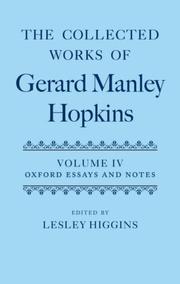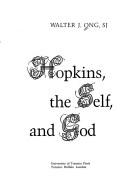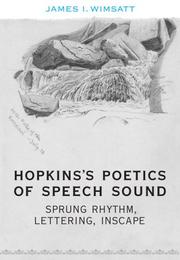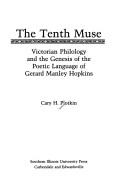| Listing 1 - 10 of 17 | << page >> |
Sort by
|
Book
Year: 2014 Publisher: [Place of publication not identified] Princeton University Press
Abstract | Keywords | Export | Availability | Bookmark
 Loading...
Loading...Choose an application
- Reference Manager
- EndNote
- RefWorks (Direct export to RefWorks)
Book
ISBN: 1282793012 9786612793011 9042031077 9789042031074 9789042031067 9042031069 9781282793019 6612793015 Year: 2010 Publisher: Amsterdam New York Rodopi
Abstract | Keywords | Export | Availability | Bookmark
 Loading...
Loading...Choose an application
- Reference Manager
- EndNote
- RefWorks (Direct export to RefWorks)
This book, the first to consider Gerard Manley Hopkins as an ecological writer, explores the dimension that social ecology offers to an ecocriticism hitherto dominated by romantic nature writing. The case for a ‘green Hopkins’ is made through a paradigm of ‘Victorian Ecology’ that expands the scope of existing studies in Victorian literature and science. Parham argues that Hopkins developed a two-fold understanding of ecology – as a scientific philosophy constructed around ecosystems theory; and as a corresponding theory of society organised around the sustainable use of energy – as well as a corresponding poetic practice. In a radical new reading of the poems, he suggests that Hopkins translated an innovative nature poetry, in which rhythm conveyed a nature characterised by dialectical energy exchange, into a social ‘ecopoetry’ that embodied the environmental impact of Victorian ‘risk’ society on its human population. Located within a ‘Victorian ecological imagination’ that fused romanticism and pragmatism, the book views Hopkins’ work as indicating the value of reconciling a deep ecological assertion of the intrinsic value of (nonhuman) nature with social ecology’s more pragmatic attempts to critique and re-conceptualise human life.
Hopkins, Gerard Manley, --- Hopkins, G. M. --- Hopkins, Manley, --- Criticism and interpretation. --- Hopkins, Gerard Manley

ISBN: 0191832499 1280844116 1429469498 0191515884 9781429469494 0199285454 Year: 2006 Publisher: Oxford Oxford University Press, .
Abstract | Keywords | Export | Availability | Bookmark
 Loading...
Loading...Choose an application
- Reference Manager
- EndNote
- RefWorks (Direct export to RefWorks)
Featuring the set of essays that Gerard Manley Hopkins composed while studying at Oxford, this collection includes topics ranging from the ethics of Plato and Aristotle to questions of political economy and voting rights. This volume offers an introduction that situates historically Hopkins's academic and creative efforts.
Hopkins, Gerard Manley, --- Hopkins, G. M. --- Hopkins, Manley, --- Criticism and interpretation. --- Hopkins, Gerard Manley
Book
ISBN: 1282040154 9786612040153 1847600123 9781847600127 Year: 2007 Publisher: Penrith [U.K.] HEB, Humanities-Ebooks
Abstract | Keywords | Export | Availability | Bookmark
 Loading...
Loading...Choose an application
- Reference Manager
- EndNote
- RefWorks (Direct export to RefWorks)
English poetry --- History and criticism. --- Hopkins, Gerard Manley, --- Hopkins, G. M. --- Hopkins, Manley, --- Criticism and interpretation. --- Hopkins, Gerard Manley
Book
ISBN: 9781443882422 1443882429 9781443877282 144387728X Year: 2015 Publisher: Newcastle upon Tyne, England : Cambridge Scholars Publishing,
Abstract | Keywords | Export | Availability | Bookmark
 Loading...
Loading...Choose an application
- Reference Manager
- EndNote
- RefWorks (Direct export to RefWorks)
This book explores the poetics of "fancy" in the works of Gerard Manley Hopkins, a term often paired with imagination in well-known Romantic poetics. It sheds new light on this concept, which is described positively in Hopkins's poetics and later becomes the essence of his idiosyncratic concept of "inscape", as shown here. Chapter One discusses the influence of Coleridge and Ruskin on Hopkins's poetics of fancy, Hopkins's experiments in the language of inspiration produced by fancy before his conversion to Catholicism, his idea of inscape as revealed by fancy, and the relation between his fanc
Christian poetry, English --- History and criticism. --- Hopkins, Gerard Manley, --- Hopkins, G. M. --- Hopkins, Manley, --- Criticism and interpretation. --- Hopkins, Gerard Manley

ISBN: 0802074138 1442623438 9781442623439 0802056881 9780802056887 9780802074133 1442655992 Year: 1993 Volume: 1981 Publisher: Toronto
Abstract | Keywords | Export | Availability | Bookmark
 Loading...
Loading...Choose an application
- Reference Manager
- EndNote
- RefWorks (Direct export to RefWorks)
General Manley Hopkins was not alone among Victorians in his attention to the human self and to the particularities of things in the world around him, where he savoured the ‘selving or ‘inscape’ of each individual existent. But the intensity of his interest in the self, as a focus of exuberant joy as well as sometimes of anguish, both in his poetry and his prose, marks him out as unique even among his contemporaries. In these studies Professor Ong explores some previously unexamined reasons for Hopkins’ uniqueness, including unsuspected connections between nineteenth-century sensibility and certain substructures of Christian belief.Hopkins was less interested in self-discovery or self-concept than in what might be called the confrontational or obtrusive self – the ‘I,’ ultimately nameless, that each person wakes up to in the morning to find simply there, directly or indirectly present in every moment of consciousness. Hopkins’ concern with the self grew out of a nineteenth-century sensibility which was to give birth to modernity and postmodernity, and which in his case as a Jesuit was especially nourished by the Spiritual Exercises of St Ignatius Loyola, concerned at root with the self, free choice, and free self-giving. It was also nourished by the Christian belief in the Three Persons in One God, central to Hopkins’ theology courses and personal speculation, and very notable in the Special Exercises. Hopkins appropriated and intensified his Christian beliefs with new nineteenth-century awareness: he writes of the ‘selving’ in God of the Father, the Son, and the Holy Spirit. Hopkins’ pastoral work, particularly in the confessional, dealing directly with other selves in terms of their free decisions, also gave further force to his preoccupation with the self and freedom. ‘What I do,’ he writes, ‘is me.’Besides being concerned with the self, the most particular of particulars and the paradigm of all sense of ‘presence,’ the Spiritual Exercises in many ways attend to other particularities with an insistence that has drawn lengthy and rather impassioned commentary from the postmodern literary theorist Roland Barthes.Hopkins’ distinctive and often precocious attention to the self and freedom puts him theologically far ahead of many of his fellow Catholics and other fellow Victorians, and gives him his permanent relevance to the modern and postmodern world.
820 "18" HOPKINS, GERARD MANLEY --- Engelse literatuur--19e eeuw. Periode 1800-1899--HOPKINS, GERARD MANLEY --- 820 "18" HOPKINS, GERARD MANLEY Engelse literatuur--19e eeuw. Periode 1800-1899--HOPKINS, GERARD MANLEY --- Christian poetry, English --- Catholics --- Poetry --- Self in literature. --- God in literature. --- History and criticism. --- Intellectual life. --- Psychological aspects. --- Hopkins, Gerard Manley, --- Criticism and interpretation. --- Hopkins, G. M. --- Hopkins, Manley, --- Hopkins, Gerard Manley --- England. --- Angleterre --- Anglii͡ --- Anglija --- Engeland --- Inghilterra --- Inglaterra

ISBN: 1281992097 9786611992095 1442675861 9781442675865 0802091547 9780802091543 0802085113 9781281992093 661199209X Year: 2006 Publisher: Toronto
Abstract | Keywords | Export | Availability | Bookmark
 Loading...
Loading...Choose an application
- Reference Manager
- EndNote
- RefWorks (Direct export to RefWorks)
Although virtually unknown in his lifetime, Gerard Manley Hopkins (1844?1889) is counted today among the great nineteenth-century poets. His poetry was collected and published posthumously by his friend Robert Bridges in 1917, and subsequently Hopkins?s reputation flowered, though more as a modern writer than as Victorian, and very little as a poetic theorist. Yet the body of Hopkins?s critical writing reveals sharp insight into the subject of poetics, and presents an innovative theory that locates primary poetic meaning in ?figures of speech sound.? These ?figures of speech sound? provide the focus for James I. Wimsatt?s erudite and original study. Drawing from Hopkins?s diaries, letters, student essays, and correspondence with poet-friends, Wimsatt illuminates Hopkins?s theory that the sound of poetic language carries an emotional, not merely logical and grammatical, meaning. Wimsatt concentrates his study on Hopkins?s writings about ?sprung rhythm,? ?lettering,? and ?inscape,? ? his coinages ? and makes abundant reference to Hopkins?s verse, showing how it exemplifies his language theory. A well-researched and highly detailed book, Hopkins?s Poetics of Speech Sound asserts major significance for a relatively neglected aspect of this important poet?s writings.
Poetics. --- Poetry --- Technique --- Hopkins, Gerard Manley, --- Hopkins, G. M. --- Hopkins, Manley, --- Versification. --- Poetics --- 820 "18" HOPKINS, GERARD MANLEY --- 820 "18" HOPKINS, GERARD MANLEY Engelse literatuur--19e eeuw. Periode 1800-1899--HOPKINS, GERARD MANLEY --- Engelse literatuur--19e eeuw. Periode 1800-1899--HOPKINS, GERARD MANLEY --- Hopkins, Gerard Manley --- 091.31:7.04 --- 091 <41 LONDON> --- 091:52 --- #BIBC:CANADIANA 2002 --- 091:52 Handschriften i.v.m. astronomie-- Zie ook: {091:133.52} --- Handschriften i.v.m. astronomie-- Zie ook: {091:133.52} --- 091 <41 LONDON> Handschriftenkunde. Handschriftencatalogi--Verenigd Koninkrijk van Groot-Brittannië en Noord-Ierland--LONDON --- Handschriftenkunde. Handschriftencatalogi--Verenigd Koninkrijk van Groot-Brittannië en Noord-Ierland--LONDON --- 091.31:7.04 Verluchte handschriften: iconografie --- Verluchte handschriften: iconografie
Book
ISBN: 1421430355 1421429942 1421430762 Year: 1966 Publisher: Baltimore, Johns Hopkins Press
Abstract | Keywords | Export | Availability | Bookmark
 Loading...
Loading...Choose an application
- Reference Manager
- EndNote
- RefWorks (Direct export to RefWorks)
In his lifetime, Gerard Manley Hopkins was known as a poet only by a small circle of his friends. More than any other major Victorian writer, he was recovered and presented as a poet to modern readers by editors and scholars of the first half of the twentieth century. This book analyzes how and to what extent the presuppositions of these critics have dictated the modern conception of Hopkins's work. Bender seeks to dispel, once and for all, the notion that Hopkins was a naïf poet. He provides an analysis of classical Greek and Latin rhetoric relative to the classical background of Hopkins's style and the structure in his poetry. He maintains that especially in Hopkins's more extreme work, such as "The Wreck of the Deutschland," there are precedents for the structure of the poem itself, the structure of the sentences within the poem, and its sensual and obscure imagery in the classical literature that Hopkins knew so well. Bender's study suggests two highly controversial positons: first, that although Hopkins is one of the most original voices in English, his poetry is within a tradition insufficiently recognized by modern critics; and second, that the effect of careful and sympathetic study of classical literature can induce quite the opposite of a neoclassical style in English.
English poetry --- Catholics --- Classicism --- Christian poetry, English --- Classical influences. --- Intellectual life. --- History --- History and criticism. --- Hopkins, Gerard Manley, --- Knowledge and learning. --- Criticism and interpretation --- History. --- Literature: history & criticism
Book
ISBN: 1786944375 1942954379 Year: 2021 Publisher: [Clemson] : Clemson University Press,
Abstract | Keywords | Export | Availability | Bookmark
 Loading...
Loading...Choose an application
- Reference Manager
- EndNote
- RefWorks (Direct export to RefWorks)
In terms of literary history, Gerard Manley Hopkins has been difficult to pin down. Many of his concerns - industrialism, religious faith and doubt, science, language - were common among Victorian writers, but he is often championed as a proto-modernist despite that he avoids the self-conscious allusiveness and indirectness that typify much high modernist poetry. It is partly because Hopkins cannot be pigeonholed that his influence remains relevant. 'The Fire that Breaks' brings together an international team of scholars to explore Hopkins's extended influence on the poets and novelist who defined Anglo-American literature throughout the past century.
English poetry --- American poetry --- History and criticism. --- Hopkins, Gerard Manley, --- Influence. --- 1900-1999 --- Contemporary British Poetry --- Gerard Manley Hopkins --- Contemporary American Poetry --- Spiritual Poetry

ISBN: 0585178747 9780585178745 0809314886 9780809314881 Year: 1989 Publisher: Carbondale : Southern Illinois University Press,
Abstract | Keywords | Export | Availability | Bookmark
 Loading...
Loading...Choose an application
- Reference Manager
- EndNote
- RefWorks (Direct export to RefWorks)
English philology --- Christian poetry, English --- English language --- Catholics --- English Literature --- English --- Languages & Literatures --- Catholic learning and scholarship --- Germanic philology --- English Christian poetry --- English poetry --- History. --- History and criticism. --- History --- Style. --- Intellectual life. --- History and criticism --- Style --- Intellectual life --- Hopkins, Gerard Manley, --- Hopkins, G. M. --- Hopkins, Manley, --- Language. --- Hopkins, Gerard Manley --- Germanic languages
| Listing 1 - 10 of 17 | << page >> |
Sort by
|

 Search
Search Feedback
Feedback About UniCat
About UniCat  Help
Help News
News